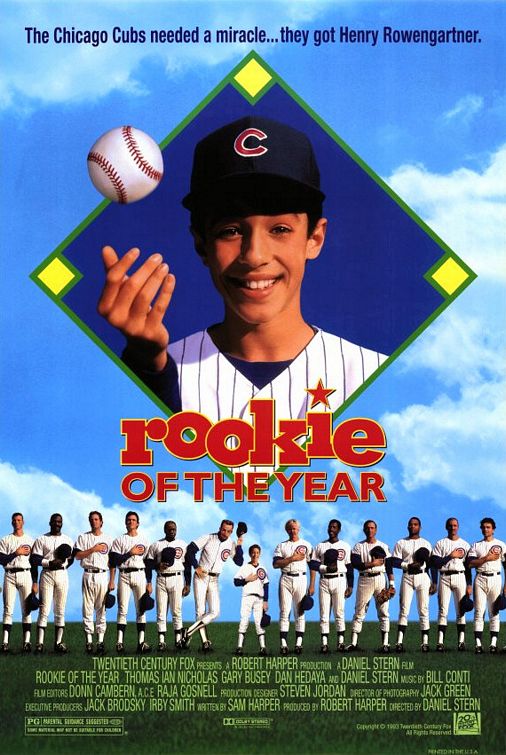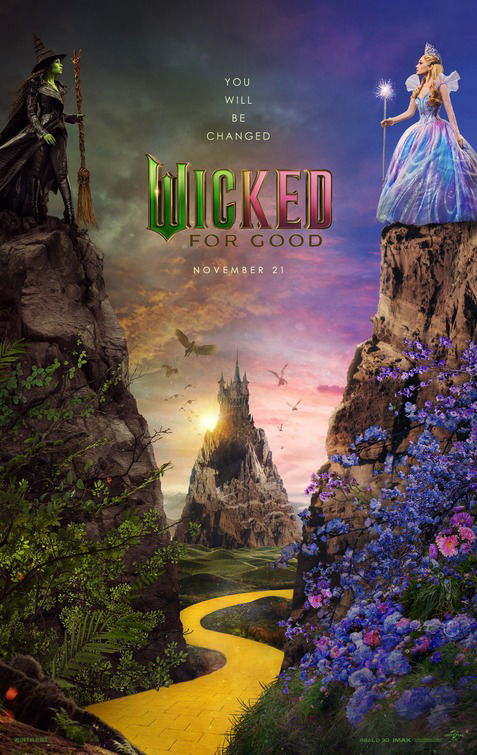“Friendship Redeems”

| None | Light | Moderate | Heavy | |
|---|---|---|---|---|
| Language | ||||
| Violence | ||||
| Sex | ||||
| Nudity |
What You Need To Know:
WICKED: FOR GOOD contains more jeopardy than the first movie. So, it’s more entertaining. However, it has a mixed worldview. For example, it has strong moral content promoting friendship and opposing tyranny. However, it also has a strong Romantic, politically correct worldview promoting animal rights, with a silly lesbian subtext. Despite this, the play’s co-creator, Stephen Schwartz, says the lead female characters have a friendship that’s “not romantic or sexual.” That said, WICKED: FOR GOOD has two scenes of implied adultery and implied fornication, and scary moments. So, MOVIEGUIDE® advises extreme caution.
Content:
Mixed pagan worldview with strong moral content promoting friendship, helping the oppressed and opposing tyranny, plus there’s a symbolic death, baptism and resurrection, but combined with strong Romantic, politically correct liberal/leftist content that strongly promotes animal rights but also opposes animal cruelty, with a light homosexual subtext (more so in the first movie than this sequel), plus there’s some feminism in the story, though story has good and bad women and good and bad men;
Man exclaims, “Oh my Lord!” when he gets a piece of information about a terrible thing he did long ago that rocks his world;
Light and strong, sometimes scary, violence includes people fight and run away from soldiers, scary flying monkeys fly around and are threatening, animals are locked in cages, soldiers capture a rebel soldier, people are threatened, there’s a scary storm with a tornado that kills a witch, a silhouette shows water being thrown on a witch and her melting, some other animals might be scary for children, an angry mob forms against the Wicked Witch of the West, a character is transformed into a tin man with an ax who chops down a door, and the Wizard has a large scary mask;
Implied fornication when man and woman are revealed under a hide to keep them warm, and it’s revealed that a case of adultery resulted in a baby;
Upper male nudity when man is lying next to woman after implied fornication;
Flashback shows a married woman being plied with alcohol by a con man and getting pregnant and having a baby;
No smoking; and,
Lyng and deceit by two villains.
More Detail:
At the end of the first movie, Galinda, aka Glinda, helped Elphaba escape from the evil Wizard and his despicable female cohort, Professor Morrible. The two women were shocked and upset that the Wizard and Morrible are behind the oppression of animals and want to use the flying monkeys Elphaba created as spies. Glinda helps protect Elphaba as she creates a flying broom and flies away.
In the sequel, Glinda decides to work with the Wizard to do good, but Elphaba has decided to oppose him and help the animals rebel.
Elphaba visits her crippled sister, Nessarose, who’s become governor of Munchkinland after their father’s death. They have a disagreement about their father, and Elphaba objects to Nessa’s expulsion of animals from Munchkinland. Nessa complains to her about never helping her and always thinking of herself. So, Elphaba tries to assuage her guilt by enchanting Nessa’s silver slippers to allow her to walk and fly. However, Boq, the Munchkin whom Nessa loves but who really loves Glinda, decides Nessa no longer needs his help. So, he decides to leave Munchkinland and return to the Emerald City where Glinda lives.
However, Nessa makes a new law forbidding people to leave Munchkinland. Boq returns to Nessa and complains, saying that his heart belongs to Glinda, not her. So, Nessa starts using a love spell against Boq, but she goofs it up and his heart starts to shrink instead. Elphaba intervenes by casting another spell, but the only thing she can do is cast a spell to make it so that Boq doesn’t need a heart to survive, and Boq transforms into the Tin Man! Boq the Tin Man leaves, and Nessa declares herself the Wicked Witch of the West.
Elphaba then learns that the talking animals, including her old nanny, Dulcibear, have decided to leave Oz because the Wizard has turned most of the humans against them. Elphaba urges them to stay but decides to visit the Emerald City and stop the Wizard.
Elphaba arrives at Emerald City. Glinda, who’s about to marry Prince Fiyero, helps her get an audience with the Wizard without Madame Morrible. The Wizard seduces the two women to join with them. He argues that, together, they can do so much good for Oz. As a sign of his sincerity, he agrees to free the flying monkeys and no longer force them to spy for him.
After freeing the flying monkeys, however, Elphaba learns the Wizard has kept from her a dark secret of his evil actions against the animals. She asks him why he’s hurting the animals, and he tells her that animals can’t be trusted.
Elphaba goes full rebel and attacks. The Wizard’s army tries to stop her, but she wrecks Glinda’s wedding with Prince Fiyero. Making matters worse for Glinda, Fiyero decides not only to help Elphaba but also that he really loves her rather than Glinda. He flees the Emerald City with Elphaba, and they hide from the Wizard’s army.
Hurt, Glinda advises the Wizard and Morrible that they can lure Elphaba out of hiding by spreading the rumor that Elphaba’s sister, Nessa, is in danger. Secretly, however, the Wizard and Morrible decide that this isn’t enough. So, Morrible plans something much more drastic, and much more horrible.
WICKED: FOR GOOD is filled with more drama and jeopardy than the first movie, so it’s much more entertaining. Most of the acting and some of the singing are good. However, the songs aren’t quite as melodic as the three best songs in Part 1, the showstoppers “Popular,” “Dancing Through Life” and “Defying Gravity.” Also, as with many of the songs in WICKED, the singing style often is operatic, which means it’s too hard to hear all the lyrics. This will be especially hard for people with hearing aids, but it was also hard for people without hearing aids, judging from the press screening MOVIEGUIDE® attended. (This was never a problem with the great musicals of the Golden Age of Hollywood, like the ones Fred Astaire, Ginger Rogers, Gene Kelly, and Judy Graland did, including the 1939 classic THE WIZARD OF OZ. Apparently, the people making movies today just don’t care about this sound problem, which even affects the dialogue in many of today’s movies.)
The biggest problem with WICKED: FOR GOOD, however, is its mixed worldview.
For example, MOVIEGUIDE® is happy to report that, like the original musical play, all of Elphaba’s magical spells backfire. Her spell to help the monkeys in Part 1 actually hurts the monkeys as they painfully sprout wings. As noted above, her spells to help her sister and to protect Boq also backfire. Later, another spell backfires and apparently kills a person (that turns out not to be true). All these mistakes lead her to embrace the idea she can never be good and will always be seen as wicked by not only the people of Oz but also the animals. So, she embraces the name the Wizard and Madame Morrible have labeled her, the Wicked Witch of the West. Thus, happily, both the original play and FOR GOOD portray witchcraft in a negative light, and Madame Morrible, who’s the Dean of Sorcery for the college in Oz, is the most wicked person of all.
Glinda, however, realizes how wicked Madame Morrible and the Wizard really are. So, she comes to rescue Elphaba, and the two women sing beautifully about their friendship in a song titled “For Good.” Both sing, “Who can say if I’ve been changed for the better? But, because I knew you, I have been changed for good.” The double meaning of the second sentence promotes a double aspect of the positive effects of friendship. Friendship not only can change a person forever or “for good,” it can also change a person to actually “be” good. Of course, fellowship with God, especially through fellowship with Jesus Christ by the power of the Holy Spirit, is the highest, most lovely and infinitely most perfect form of fellowship and friendship.
Besides friendship, WICKED: FOR GOOD encourages viewers to stand up against the tyranny and oppression that comes from heartless, deceptive, sadistic big government despots seeking absolute power and/or sadistic pleasure. As God tells the Hebrews and Bible readers in 1 Samuel 8:1-20, big government will lead to tyranny, slavery and destruction because it rules by brute force and autocratic human despotism rather than God.
All that said, WICKED: FOR GOOD has some Romantic, politically correct content. For example, the movie’s tyrannical leaders are opposed to animal rights, and the human characters are prejudiced against Elphaba because of her green skin color. Some of them even try to bully her, including her roommate, Glinda. However, Glinda happily decides in the first movie that the bullies go too far. So, does the Prince. Also, the Prince, then Glinda, take up Elphaba’s concern for the suffering of the oppressed animals.
More problematic is the fact that both WICKED movies have a silly politically correct lesbian subtext. Thus, many LGBT, liberal and leftist critics and fans of the movies, and the original musical, see Glinda and Elphaba’s friendship as a love story between two closeted lesbians. So do some of the actresses playing the characters, including the stars of the movie version, Ariana Grande and Cynthia Erivo.
However, although the two women dance together in the first movie, they never kiss romantically. In fact, Elphaba runs off with Prince Fiyero, not Glinda. Also, the play’s composer and co-creator, Stephen Schwartz, said in 2024, when the first movie was released, that the two women’s friendship in the play is platonic, “not romantic or sexual.”
Whatever the truth, however, MOVIEGUIDE® advises extreme caution for this subtext, especially in the first movie, and the other politically correct content in WICKED: PART 1 and WICKED: FOR GOOD.
Also, both movies show that Elphaba has green skin because her married mother was seduced by a traveling salesman from another world who plied her with a green alcoholic concoction. Thus, the mother’s husband was really Elphaba’s stepfather, not her real father. Later, in FOR GOOD, the real father learns that Elphaba is his daughter, and he says, “Oh, my Lord! What have I done?” Finally, when Elphaba runs off with Prince Fiyero, they kiss passionately, and the movie cuts to the next morning where they’re lying together. Thus, WICKED: FOR GOOD not only reminds viewers that her mother committed adultery, but also shows that Elphaba and the Prince sleep together.



 - Content:
- Content: 
